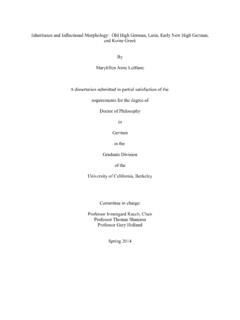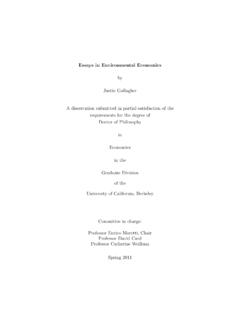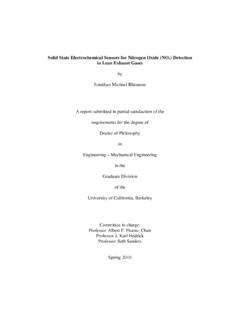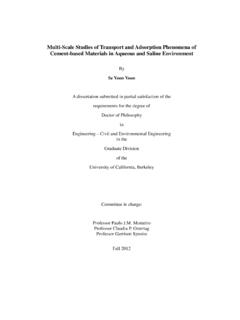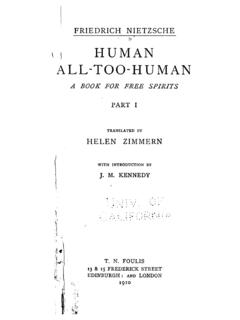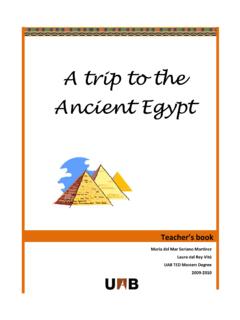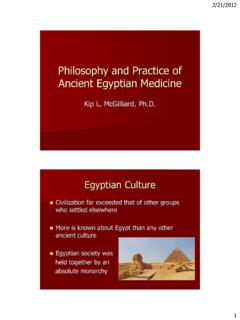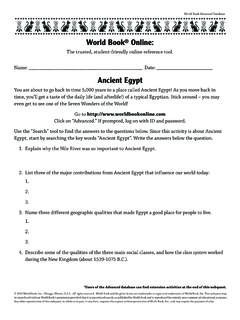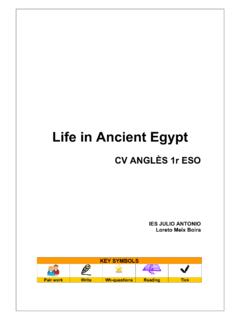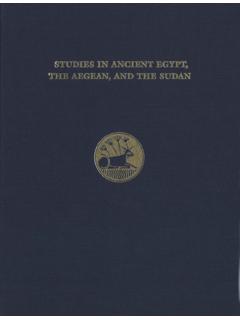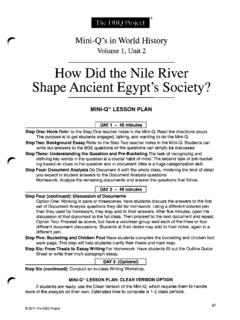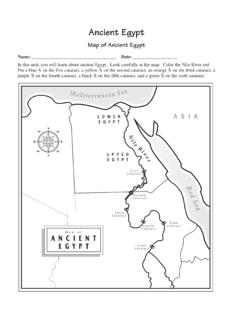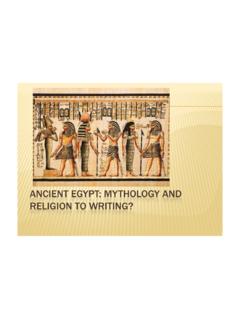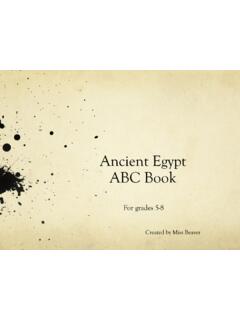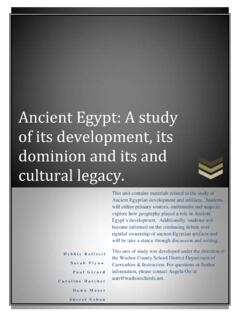Transcription of Ancient Egypt, Sacred Science, and Transatlantic ...
1 Ancient egypt , Sacred Science, and Transatlantic Romanticism By Marques Jerard Redd A dissertation submitted in partial satisfaction of the requirements for the degree of Doctor of Philosophy in English in the Graduate Division of the University of California, Berkeley Committee in charge: Professor Samuel Otter, Chair Professor Kevis Goodman Professor Whitney Davis Spring 2011 Ancient egypt , Sacred Science, and Transatlantic Romanticism 2011 by Marques Jerard Redd 1 Abstract Ancient egypt , Sacred Science, and Transatlantic Romanticism by Marques Jerard Redd Doctor of Philosophy in English University of California, Berkeley Professor Samuel Otter, Chair Ancient Egyptian culture has been a powerful influence on a major tradition of English literature that runs from Edmund Spenser s The Faerie Queene (1596)
2 , one of whose major iconographic centers is the temple of Isis, to John Crowley s four-volume novel gypt (2007). My dissertation focuses on the Romantic period the midpoint of this trajectory because it is an extremely intense moment of this influence. In addition to the visions of egypt presented in the Bible, Greco-Roman writers, and travel narratives, Ancient egypt reached American and British culture of the time through a variety of channels, such as (1) Napoleon s invasion of egypt in 1798, which allowed a stream of Egyptian monuments to travel into Europe and America; (2) the deciphering of the hieroglyphics in 1822; (3) an Egyptian-inspired freemasonry, which wielded a major effect on political revolutions in the USA, France, and Haiti.
3 And (4) revived interest in heterodox Alexandrian traditions such as alchemy, gnosticism, and hermeticism. These channels transmitted a mediated Egyptian Sacred science, which can be defined as a transdisciplinary form of knowledge that does not aim to study external objects or manipulate abstract signs and empirical processes, but rather strives to the catalyze the transformation and expansion of consciousness itself, with the final goal being the divinization of the human. This project explores the work of a series of canonical British and American Romantic figures most deeply engaged with this legacy of Ancient egypt .
4 In interlinked chapters on Samuel Taylor Coleridge s Ode on Astronomy, Kubla Khan, and Rime of the Ancient Mariner, Walt Whitman s Leaves of Grass, and Herman Melville s Moby-Dick, I argue that Egyptian Sacred science provided a conceptual foundation for spiritualized representations of, respectively, the natural world, the self, and deific powers (or gods ) that link these two domains and situate them within a network of larger cosmic dynamics. 1 Introduction: Does a Theory of Literature Need Egyptology? I begin with a passage taken from the Corpus Hermeticum, a second and third century CE Alexandrian collation of Greek and Latin texts that were attributed to Hermes Trismegistus, the thrice-great Hermes, whom the Ancient Egyptians knew as Thoth, the wisest of the gods.
5 In the dialogue Asclepius found in this anthology, Hermes Trismegistus provides an exposition on the nature of cosmology and hence, on the nature of God, time, and the cycles of life. In the midst of these thoughts, he boldly describes to his pupil Asclepius the symbolic significance of egypt in the spiritual history of the world: Do you not know, Asclepius, that egypt is an image of heaven, or, to speak more exactly, in egypt all the operations of the powers which rule and work in heaven have been transferred to earth below? Nay, it should rather be said that the whole Kosmos dwells in this our land as in its In Ancient egypt , it was believed that temple ritual not only mirrored, but sustained the workings of the heavens.
6 The successful implementation of traditional rites insured the success of celestial causes on terrestrial effects, or in other words the bringing down of heaven to earth. Furthermore, egypt is constructed as the temple of the world because the gods (or hypostatizations of these celestial powers) lived there. This excerpt is not a fanciful proclamation of ethnocentrism. Hermes Trismegistus says these words by way of introducing a prophecy, which falls into two parts. First, he tells Asclepius that a time will come when egypt , the sanctuary or temple of the Kosmos, will be left desolate.
7 A grand apocalyptic scenario is spun as Hermes Trismegistus somberly states that men will be weary of life, and they will cease to think the universe worthy of reverent wonder and of worship. 2 The gods will depart from humankind, presaging a state where darkness will be preferred to life. 3 Destruction abounds everywhere as the world itself becomes shaken soil turns barren, the very air sickens and stagnates, and old age comes upon the world. However, the prophecy contains a subsequent moment of redemption. When all this has come to pass, says Trismegistus, through an act of grace there will be a renewal of human consciousness of the Sacred .
8 Wonder and reverence will once again fill human hearts. There will be a general reawakening to the divine, which will cause human beings once more to sing unceasing hymns of praise and blessing. This will amount to a new birth of the Kosmos, a holy and awe-striking restoration of all nature. 4 The idea of a vast cosmic cycle, within which egypt has a special symbolic importance, is presented here. As the temple of the Kosmos, Ancient egypt arguably crystallized in itself a peak of human spiritual attainment and relatedness to nature that has become a crucial part of Western cultural memory and the unfolding of this tradition.
9 1 Walter Scott, trans., Hermetica Part 1: The Ancient Greek and Latin Writings Which Contain Religious or Philosophic Teachings Ascribed to Hermes Trismegistus (Montana: Kessinger Publishing, LLC, 1995) 341. 2 Scott 343. 3 Scott 343. 4 Scott 347. 2 (This text, I should emphasize, was written in Latin.) Yet at the same time, this prophecy, although ostensibly to do with the fate of egypt , embraces a larger historical process than simply that of Ancient Egyptian civilization, and perhaps Trismegistus s words imply that we make a mistake in regarding egypt as belonging to an epoch essentially different from our own.
10 Indeed, he seems to be describing, to use a Heidegerrian term, the destiny of the West itself. As we in the contemporary moment so obviously live in a disenchanted, polluted world, we might feel inclined to acknowledge that the first part of the prophecy has now been fulfilled: egypt standing allegorically for humanity and nature has been desolated. Though this opening stage has been virtually accomplished, the second stage the restoration of the temple seems to be only just beginning. In many respects, this process of redemption was heralded by the Romantic period of literature, which will be the special focus of this dissertation.

